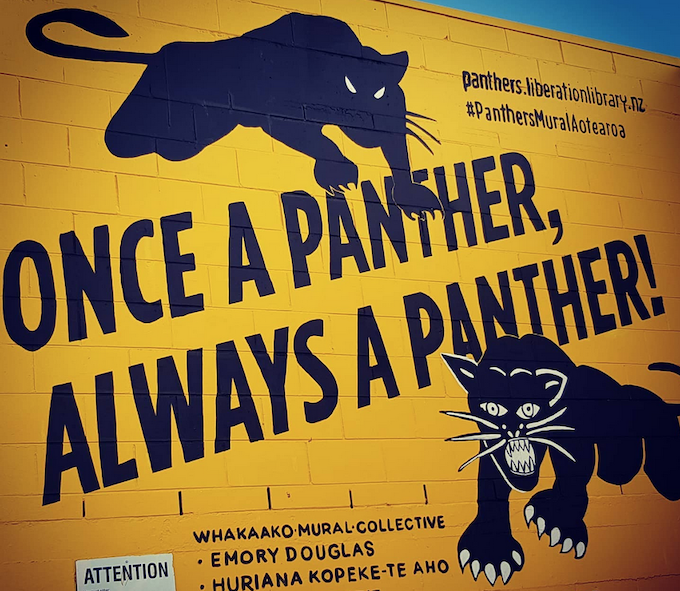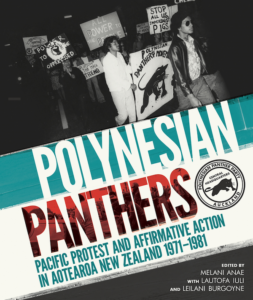
COMMENT: By Melani Anae
When the Polynesian Panthers (PPP) activist group began calling for an apology for the Dawn Raids two years ago, we went into the process with eyes wide open. Government lobbyists seldom get everything they ask for, but our intent was honest and real and fuelled by our Panther legacy and love for the people.
We believe that the apology was, and is, a necessary step towards the healing and restoration of trust and relationships between the Pacific peoples and families who were adversely affected by government actions during the Dawn Raids and the Aotearoa New Zealand government.
The prime minister’s emotional ritual entry into Auckland’s Great Hall and her address to Pacific people and communities assembled there last Sunday drastically relived the shameful and unjust treatment of Pacific peoples by successive governments during the Dawn Raids era of the 1970s, when police, hunting for immigrant overstayers and armed with dogs and batons, would burst into the homes of Pasifika families in the early morning hours.

These experiences and the subsequent deportations have created layers of intergenerational shame and trauma for Pacific victims and families in New Zealand and in the homelands. Studies have since shown that Pacific people made up only 30 percent of the overstayers, and yet almost 90 percent of the deportations.
The bulk of the migrants who overstayed their visas were from the US and UK. Since the apology was announced there has been a flood of victims’ stories –- stories no longer silenced by the guilt, shame and trauma of the raids and random checks.
What was missing from Sunday’s apology was a list of concrete actions the government will take in addressing the injustices. Instead, what was delivered were four “gestures”: some national and Pacific scholarships, and two other educational “gestures” that were really already in place — a publication about experiences of the Dawn Raids and the provision of resources to those schools already teaching about them.
Why has the government remained silent about setting up a legacy fund to allow education about the Dawn Raids — as requested in the petition signed by more than 7000 people and presented to Parliament by Josiah Tualamali’i and Benji Timu — to prevent future generations of New Zealanders from carrying out the same or similar racist actions?
Educate to Liberate
The only programme currently addressing this is an unfunded one run by the PPP for 50 years and more specifically for the past 10 years with their Educate to Liberate programmes in schools.
This was a far cry to what the Panthers were calling for.
In its submission for healing and restoration to the government in May, the Panthers were clear about what they wanted: an apology as well as 100 annual scholarships, and the overhaul of the current educational curriculum to include the compulsory teaching of racism, race relations, the Dawn Raids and Pacific Studies and the significance of the Treaty of Waitangi as the cornerstone of harmonious race relations in Aotearoa New Zealand, across all sectors, and assessed as “achieved standards” across appropriate non-history subjects.
If what we Panthers called for was granted and acted on, it would provide a clear message to all Pacific peoples and communities and to all New Zealanders that the government was ready for a truly liberating education and a world-leading pathway to the best race relations — Kiwi-style — in the world.
Alas, what the apology delivered was a watered-down version of what the Panthers called for. By perpetuating a myopic view of our long-term educational needs, the short term gestures outlined in the apology will not be enough to grow a truly liberated and informed youthful leadership for the future.
This oversight suggests a rocky future for the New Zealand government and the va (the social and sacred spaces of relationships) with Pacific peoples. The Polynesian Panther demands to annihilate racism in New Zealand might seem too revolutionary and drastic, and will probably fuel anti-Pacific sentiments, but is this really the absolute maximum that the government can do?
What we were given in this apology did little to dismantle systemic racism. Much more work needs to be done to decolonise and re-indigenise our education system. Why is the teaching of the Dawn Raids only optional and not compulsory? The Panthers platform of peaceful resistance against racism, the celebration of mana Pasifika and a liberating education is as relevant now as it was in the era of the Dawn Raids.
If the changes the Panthers have fought for over the last 50 years don’t materialise, then we have no alternative but to — as Māori scholar and activist Ranginui Walker puts it — “ka whawhai tonu matou [we will continue the fight]”.
Dr Melani Anae is a foundation member of the Polynesian Panthers and an associate professor and director of research at the Centre for Pacific Studies, Te Wananga o Waipapa, University of Auckland. Her books include The Platform: The Radical Legacy of the Polynesian Panthers (2020), Polynesian Panthers: Pacific Protest and Affirmative Action in Aotearoa NZ 1971–1981 (2015), and Polynesian Panthers (2006). This article first appeared in The Guardian and has been republished here with the author’s permission.












































